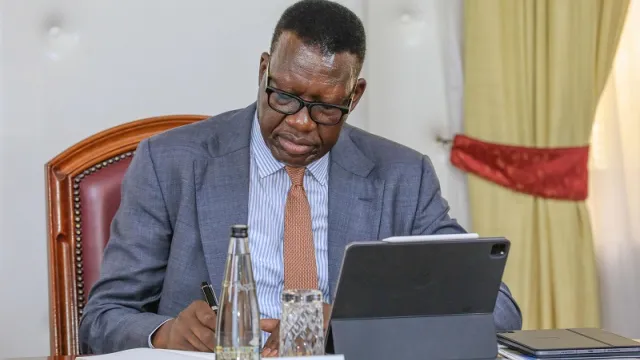Kenya's Sh66Bn bet on Bomet-Narok line to stabilise power supply

Kenya's Sh66Bn bet on Bomet-Narok line to stabilise power supply
Kenya is banking on a Kes66 billion investment in a new electricity transmission line to address persistent power outages that have negatively impacted the country over the last three months.
Following a Cabinet meeting on Wednesday, the Ministry of Energy was directed to comprehensively address the challenge of power failures. President Ruto noted that frequent power outages were damaging Kenya's investment profile.
"To address the overloading of transmission lines causing outages, the Bomet-Narok line will be constructed with Kes66 billion from the African Development Bank. The line, which was funded in 2016, has not been built due to legal disputes," noted a section of the Cabinet brief.
In addition, a Kes200 billion KenGen solar power project at the Seven Forks Dam will serve as a safeguard against power failures, explained the Cabinet note.
Power supply outages
The 42MW project features substantial battery storage, and in the event of a power failure, the stored energy will come into play. Furthermore, the project contributes to preserving hydropower at the five dams that constitute the Seven Forks.
The Cabinet's decision to take action comes in response to a series of recent power outages, with the most recent occurring on Sunday, December 10th. During this incident, a substantial portion of Kenya experienced a widespread blackout, prompting Transport Cabinet Secretary Kipchumba Murkomen to call for an investigation into potential acts of sabotage and cover-up.
Notably, this marked the third nationwide outage in three months, with even the standby generators at the Jomo Kenyatta International Airport (JKIA) failing to activate.
The electricity failure commenced around 8pm on Sunday, impacting critical facilities, including JKIA. As a significant transport hub connecting East Africa to Asia, Europe, and other parts of the world, the outage raised concerns about Kenya's infrastructure reliability and prompted heightened scrutiny into the causes of these recurrent power disruptions.
Noting the recent significant outages, CS Murkomen stated, soon after visiting the airport late on Sunday, that "we are making a formal request to the National Police Service to investigate possible acts of sabotage and cover-up."
On its part, utility Kenya Power attributed the blackout to a "system disturbance," while Energy CS Davis Chirchir warned of another nationwide blackout if investment is not rolled out to strengthen current power supply network across Kenya.
CS Chirchir explained that there was an overload at the Kisumu-Muhoroni power line, which "felt threatened and tripped," subsequently cascading across the rest of the country.
Read also: Cross-selling offers banks a new frontier for diversification
'Jirani hana umeme'
"There was a sudden demand, and the line is dimensioned to carry 80MW. When the line went down, it was carrying 120MW, and suddenly there was a demand for an additional 20MW on that line."
According to Ketraco Managing Director Eng. John Mativo, the Kenya 20-year Transmission Master Plan needs US$5.3 billion to implement, an undertaking that calls for US$250 million worth of projects per year to increase grid coverage while also increasing the network's redundancy. "We currently have a grid size of 170km per million people in Kenya," Eng. Mativo notes on X.
Jolted by the occurrence of the third electricity blackout in less than three months, social media users in Kenya voiced their demand for explanations from Kenya Power and the Energy CS.
Simultaneously, some individuals on social media ridiculed the utility, suggesting that its performance was inferior to power companies in Nigeria and South Africa, where regular rationing or load-shedding is a common practice.
Additional ridicule aimed at Kenya is surfacing from the online communities in Tanzania, Uganda, and Rwanda, sparked by the electricity challenges afflicting Kenyans. A tweet remarked, "Jirani hana umeme, hana unga, anaongea tu kiingereza kwa giza," loosely translated as "The neighbor has no electricity, no flour, just speaking English in the dark."



